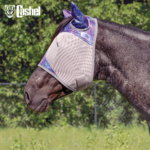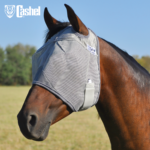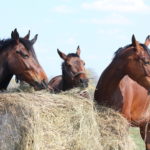It’s autumn?time for all around winter prep, and that includes your horses. The American Youth Horse Council reminds every horse owner or caretaker that cold, wet weather brings additional considerations for the well-being of our equines.

Feed and Water:
- Forage for Heat and Health: Digesting food is the horse’s most effective source of heat. Cold weather increases the horse’s calorie requirements; make sure to adjust quantity accordingly. And as pasture quality declines or you transition the horse to hay, consider supplementing with concentrates containing minerals and vitamins.
- Water: Horses need water year-round for healthy digestion, and that does not mean snow. Make sure your horse has ready access to water at all times.
- Teeth: Teeth in poor condition will prevent the horse from getting adequate calories and nutrition. Have teeth attended to now so the horse doesn’t have to play nutritional catch-up in the most frigid weather.
Bodily Comfort:
- Wooly coat: The horse’s own coat is designed to keep him warm. Let it grow and thicken naturally.
- Shelter: Even a luxuriant natural coat will lose insulating loft if it gets wet, and wind can strip a horse’s heat as fast as moisture. Provide shelter at all times that protects from rain, snow and wind.
- Extra Insulation: A clipped horse may need a blanket, as might older horses or those in poor health. But a wet blanket (from weather or the horse’s own sweat) is just as useless as a wet hair coat, or worse. Provide a blanket that is waterproof and breathable. Remove the blanket daily and check the horse’s coat for skin and hair condition.
Health Matters:
- Vaccinations: Check with your vet about fall vaccinations, especially for the horse still exposed to others outside his regular herd.
- Parasite Control: Maintain a regular deworming plan. After the first heavy frost, use a product that kills bot larvae.
- Hooves: Keep up with hoof care?hooves continue to growth throughout the winter. If possible, let the horse go barefoot for the winter for safer traction and to avoid snow build-up that can cause sole bruising.





